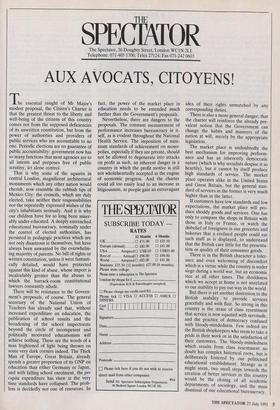'I'HE
SPECTATOR
The Spectator, 56 Doughty Street, London WCIN 2LL Telephone: 071-405 1706: Telex 27124; Fax 071-242 0603
AUX AVOCATS, CITOYENS!
The essential insight of Mr Major's modest proposal, the Citizen's Charter is that the greatest threat to the liberty and well-being of the citizens of this country comes not from the supposed deficiencies of its unwritten constitution, but from the power of authorities and providers of public services who are accountable to no one. Periodic elections are no guarantee of public accountability: government now has so many functions that most agencies are to all intents and purposes free of public scrutiny, let alone control.
That is why some of the squares in central London, magnificent architectural monuments which any other nation would cherish, now resemble the rubbish tips of Mexico City: the councils, which are duly elected, take neither their responsibilities nor the repeatedly expressed wishes of the, city's inhabitants seriously. And it is why our children have for so long been miser- ably under-educated. A deeply entrenched educational bureaucracy, nominally under the control of elected authorities, has persisted in pedagogic practices which are not only disastrous in themselves, but have always been unwanted by the overwhelm- ing majority of parents. No bill of rights or written constitution, unless it were fantasti- cally detailed, would have protected against this kind of abuse, whose import is incalculably greater than the abuses to which the barrack-room constitutional lawyers constantly allude.
There will be resistance to the Govern- ment's proposals, of course. The general secretary of the National Union of Teachers has already said that, without increased expenditure on education, the publication of school results and the broadening of the school inspectorate beyond the circle bf incompetent and politically motivated educationists will achieve nothing. These are the words of a man frightened of light being thrown on some very dark corners indeed. The Thick Man of Europe, Great Britain, already spends a greater proportion of its GNP on education than either Germany or Japan, and with falling school enrolment, the per capita expenditure has risen at the very time standards have collapsed. The prob- lem is decidedly not one of resources. In fact, the power of the market place in education needs to be extended much further than the Government's proposals.
Nevertheless, there are dangers to the proposals. The constant measurement of performance increases bureaucracy in it- self, as is evident throughout the National Health Service. The imposition of mini- mum standards of achievement on mono- polies, especially if they are private, should not be allowed to degenerate into attacks on profit as such, an inherent danger in a country in which the profit motive is still not wholeheartedly accepted as the engine of economic progress. And the charter could all too easily lead to an increase in litigiousness, as people gain an extravagant idea of their rights unmatched by any corresponding duties.
There is also a more general danger; that the charter will reinforce the already pre- valent notion that the Government can change the habits and manners of the nation at will, merely by the appropriate legislation.
The market place is undoubtedly the best mechanism for improving perform- ance and has an inherently democratic nature (which is why socialists despise it so heartily), but it cannot by itself produce high standards of service. The market place operates alike in the United States and Great Britain, but the general stan- dard of services in the former is very much higher than in the latter.
If customers have low standards and low expectations, the market place will pro- duce shoddy goods and services. One has only to compare the shops in Britain with those in Italy or France, or watch the disbelief of foreigners in our groceries and bakeries that a civilised people could eat such stuff as is displayed, to understand that the British care little for the presenta- tion or quality of their consumer goods.
There is in the British character a toler- ance and even welcoming of discomfort which is a virtue while the country is under siege during a world war, but an economic vice at all other times. The shoddiness which we accept at home is not unrelated to our inability to pay our way in the world.
But there is yet another dimension to the British inability to provide services gracefully and with flair. So strong in this country is the strain of class resentment that service is now equated with servitude, and the practice of democracy confused with bloody-mindedness. Few indeed are the British shopkeepers who seem to take a pride in their work or in the satisfaction of their customers. The bloody-mindedness which results from class resentment no doubt has complex historical roots, but is deliberately fostered by our politicised educational establishment. Strange as it might seem, two small steps towards the creation of better services in this country would be the closing of all academic departments of sociology, and the mass dismissal of our educational bureaucracy.


















































 Previous page
Previous page